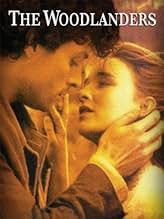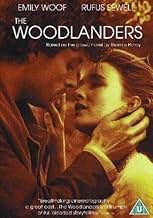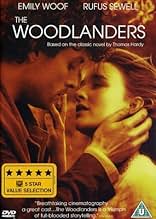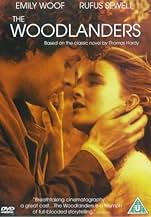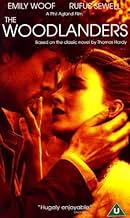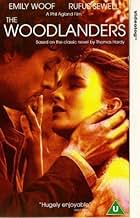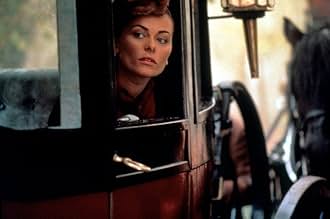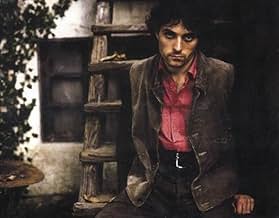The story is set in late 19th century rural corner of South England. The daughter of timber merchant Melbury, Grace, returns to the town after finishing school. Her father now believes she c... Read allThe story is set in late 19th century rural corner of South England. The daughter of timber merchant Melbury, Grace, returns to the town after finishing school. Her father now believes she can find a better husband than her childhood sweetheart, woodsman Giles. She marries handso... Read allThe story is set in late 19th century rural corner of South England. The daughter of timber merchant Melbury, Grace, returns to the town after finishing school. Her father now believes she can find a better husband than her childhood sweetheart, woodsman Giles. She marries handsome young doctor FitzPiers, but soon finds out he's not the man of her dreams and she still... Read all
- Awards
- 3 wins & 1 nomination total
- Director
- Writers
- All cast & crew
- Production, box office & more at IMDbPro
Featured reviews
Earnest, well-made and atmospheric, a decent film that falls short
George Fenton's music score has a lot of beautiful sweep and passion, underlying the tragedy of the story convincingly but not obviously, unsurprising seeing as Fenton's music has always had that effect, while the script is literate and true in spirit to Hardy's prose. The story may lack the depth of the book and the beginning and end have pacing lulls, however it is still told beautifully and compellingly with faultless mood contrasts, and deserves further credit for matching the slow but spacious pacing of the book, handling the romance subtly, the rural if at times gloomy atmosphere it evokes and for how well it makes an effort to convey how the characters would interact, speak and behave. Phil Agland does a solid job directing, really not bad for a feature film debut. Rufus Sewell is a smouldering and affecting Giles, the character we feel the most for. Emily Woof's Gracie is luminous and strong-willed as well as equally touching, it's a different character for her and she acquits herself very well. Cal Macaninch is suitably sly and snobbish, while Polly Walker makes a sinister impact, Jodhi May is a sympathetic Marty South(more so than in the book) and Tony Haygarth makes for a very ideal father-figure, of the firm yet warm and well-intended kind. All in all, falls short but it is well made and earnestly done. 7/10 Bethany Cox
The Hardy Way
Hardy's characters are quite human, they are always looking for happiness in the wrong places, making bad choices, missing the best opportunities. Here is not different. Marty loves Giles who loves Grace who loves him no more. She is unsure about her feelings since she returned from a period of studies in the town. The small village where she grew up doesn't look much attractive now, neither Giles does. She dreams about going abroad with Mrs. Charmond, the rich landowner widow, while she flirts with the newcomer young doctor - he also came from the town. Soon all of them will be facing the unavoidable fate.
The woodworker Giles (Rufus Sewell) reminds me the shepherd Gabriel from "Far from the Madding Crowd": both are honest, hard-working, heartbroken men. Emily Woof is just perfect as Grace; she looks like Cate Blanchett and she can even play like her. Unfortunately Jodhi May has just a small role as Marty the poor girl who sells her beautiful long hair to survive, a very sympathetic character. Tony Haygarth is also excellent as Grace's father, a well-intentioned man who wishes only the best for his daughter, but practically manipulates her life. I usually see Haygarth playing weird roles, like Renfield in "Dracula" (1979) or the Mad Hatter from Alice's Wonderland in "Dreamchild", so it is refreshing to see him playing normal types. Good film, good story, but not recommended for people looking for something light.
Old-fashioned Hardy weepie
The Woodlanders are the inhabitants of a small village. Country folk Grace Melbury (Emily Woof) and Giles Winterborne (Rufus Sewell) were childhood sweethearts but when Grace comes back from boarding school, she finds herself unable to mix with Giles and the other villagers. Her father (Tony Haygarth) encourages her to marry new doctor Eldred Fitzpiers (Cal Macaninch) who is more befitting of her new educated self. However Fitzpiers cannot cope with mixing with the woodlanders, and Grace's heart pangs for Giles once more.
There are two things Thomas Hardy is famous for: gloomy fate and Wessex, a fictional version of South West England. The third thing that he should be famous for is romance. The film is achingly romantic as everybody pines for the person that they cannot have. There's a secondary character who is also in love with Giles- odd reclusive Marty South (Jodhi May), who shares Giles' passion for nature. I would like to have seen more of her character but maybe that would just add to the aching tragedy of it all.
Apart from the tragic finale, the gloomiest moment has to be when Giles' house gets demolished and Mrs Charmond (Polly Walker), a wealthy patient with her eye on Fitzpiers, complains that his house is blocking the road- cue a shot of a rotting pile of wood.
In a sense, the film is a bit like Marty South: odd, obscure, slow and innocent. The slow pace works in a sense as you soak up all the beautiful cinematography and the gorgeously tragic score. Characters never have massive rages of passion- in that sense, it's a little bit like Chekhov. Life, miserable as it is, goes on.
All of the characters are sympathetic, even Dr Fitzpiers. Macaninch's performance is enigmatic: on one hand, Fitzpiers is a cruel and adulterous snob; on the other, he's a man of science who just doesn't understand the old-fashioned ways of the country people. Grace's father does her the most harm, forcing her to better herself because of his own feelings of inferiority, and yet Haygarth gives a warm and touching performance.
As the leads, Woof is adorably childlike as Grace and Sewell makes for a nice simple countryman. The film- I don't know the novel- is all about simplicity and innocence. The world of sexual desire is not present here, making the intrusion of Mrs Charmond all the more unpleasant. Her garish red dress is completely out of place in the charming pastel attire of the villagers and one longs for her and Fitzpiers to leave so we can hang forever in that wonderful idyll.
My criticism would be that they could have fitted more in. The film seems to touch on the novel rather than portray it, and maybe a more conventional dramatic pace might have helped there. Maybe more probing of the social issues would have been good- really, just more of everything.
This is definitely a Sunday afternoon film- a slow languid weepy, just like the good old days, that you can watch with anyone of any age. But to be honest, it's the perfect film to watch on your own as you allow it to wash over you.
Rather wonderful
It has an immense integrity - the recreations of the woodlander's homes and workplaces, as mentioned earlier the superb faultless control of the quality of light (longish scenes shot just after dawn, at dusk etc etc), the authentic period behaviour and manners, the unforced pace mirroring the mood. It is full of traditional understated virtues both the story itself and in the way it wears its technical virtuosity.
If Titanic (mentioned by an earlier reviewer) was a great clanking iron CGI mechanical monster, heavy handed in all departments, this is all living and breathing humanity on a human scale - an increasingly rare treat.
Wonderful interpretation of Hardy's complicated classic; beautiful stars, beautiful scenery, too
Did you know
- TriviaFinal film of Sheila Burrell .
- Quotes
Marty South: Oh, Giles, if only you could tell your heart to be free.
Giles Winterbourne: You can't tell the heart. The heart hopes. Most of all where it's hopeless.
- How long is The Woodlanders?Powered by Alexa
Details
- Runtime
- 1h 38m(98 min)
- Sound mix
- Aspect ratio
- 2.35 : 1

